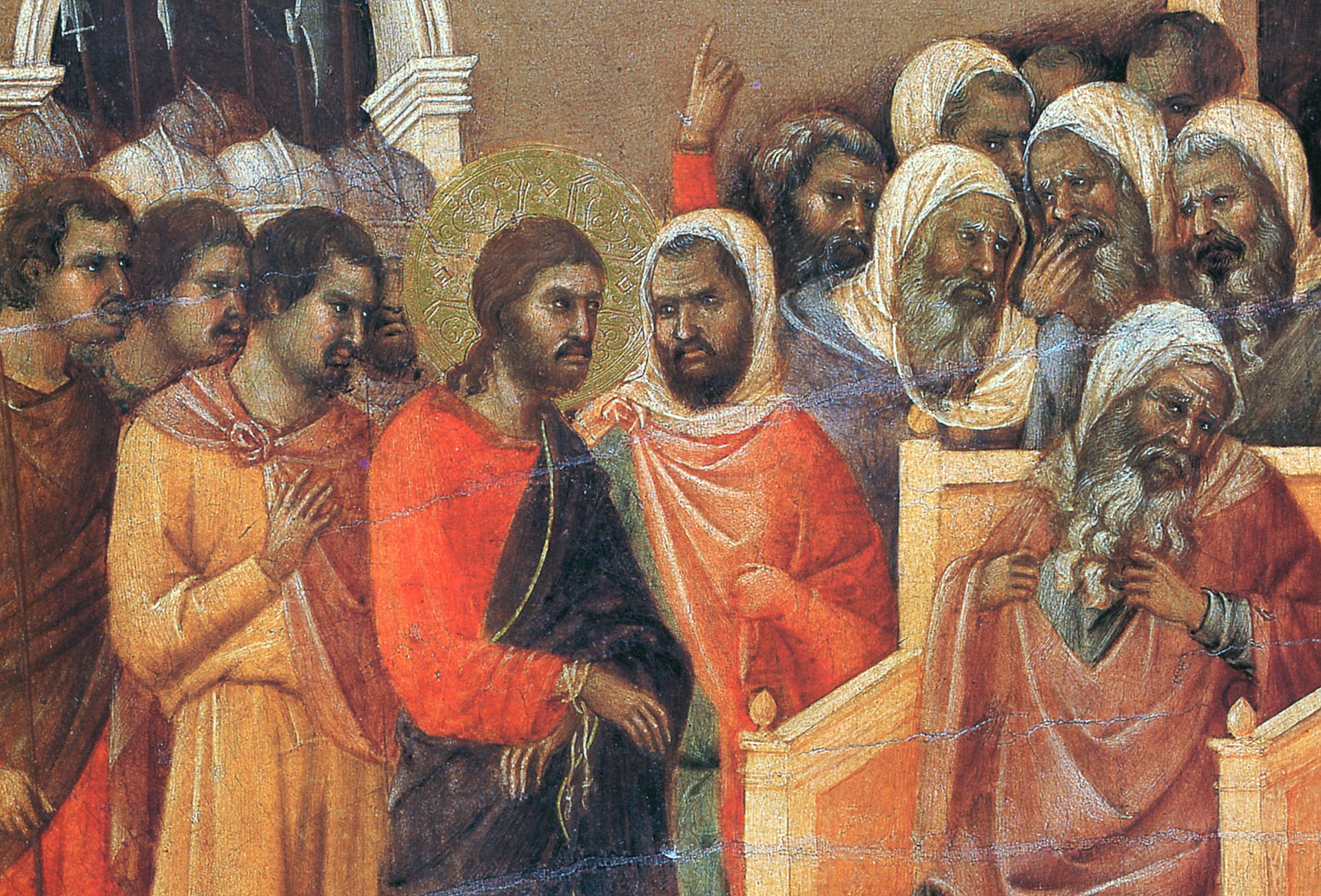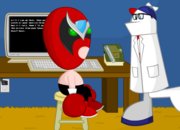I've been wanting for a while now to set forth an answer to the question, "Why be a Catholic in the first place?" Partly because I have a difficult time answering that question. I find that faith, for me, is more and more precisely faith, and not simply the consequence of a chain of reasoning with a small and simple step of trust at the end of it. That's not to say I've started to find my faith irrational; not in the least; but, in the face of the uncertainties and still more the suffering that faith can involve us in, the nature of the problem has changed.
O Lord, thou hast deceived me, and I was deceived, begins the lesson from the Eleventh Sunday After Trinity.* Not the kind of language we are used to hearing in the Scriptures. But it is by no means absent, as a glance at the weeping prophet, or Job, or Ecclesiastes would tell us: and I think our approach to the Scriptures, and correspondingly to God, is rather deficient within the Church. I think that is also one of the reasons our apologetics are often so utterly ineffective. Being religious, we want the sort of God that appeals to and makes sense to a religious person -- a tidy, predictable God, whom we can control through right thought and right behavior -- in a sense, a moralist magician's deity. God can use anything, even religion; but religion itself is not God. The worship of holiness rather than of God is without doubt the deadliest of all spiritual poisons, something I know only too well from worshipping holiness, treating the means to God as an end in itself.
Caiaphas, being the high priest that year, said unto them, Ye know nothing at all, nor
consider that it is expedient that one man should die for the people ... And this spake
he not of himself: but being high priest that year, he prophesied ... -- John 11.xlix-l
Christ Before Caiaphas, Duccio, 1308-1311
The thing is, God made man in His own image, and human life is the product of man. The Sabbath was made for man, not man for the Sabbath; or, to apply the maxim to the present discussion, it is religion which serves the needs of man, not man who serves religion. Now, one of the needs of man is precisely for real contact with a real God. But humanity is a much messier affair than most religious people tend to be comfortable with, and our account of reality -- or, translated into philosophic terms, our apologetics and theology -- has to do justice to that, or it isn't worth much.
So, in writing such a defense (or explanation) of Catholicism, I'd like to avoid a few things that, I feel, are characteristic errors and even sins on the part of Catholic apologists. For instance:
1. I'm not going to explain away the sins of the Church. I do think that the Catholic Church gets a much worse rap than she deserves, partly because of the extreme ignorance of history that our culture gets from many sources, and not least from history classes. But when factual corrections and social context and the like have done all they can -- and they can do something -- the brute fact remains that Christians, sometimes at the highest levels of the Church, have done some unambiguously horrible, indefensible things. I don't propose for one moment to justify any of that by a shabby, triumphalistic revision of Catholic history. That is at least as wrong and irrational as the radical, anti-Christian revision of history that makes the Church guilty of every bad thing that has happened in the West since Constantine, if not more so.
All the same, though, fun fact: Galileo was never condemned for heresy, and the reason
he was tried had as much to do with the fact that he was kind of an asshole as it did with his
scientific assertions. He was still treated unfairly, but there's no time to explain that now.
Galileo Before the Holy Office, Joseph Nicolas Robert-Fleury, 19th cent.
To put the same thing another way, I do propose to explain Catholicism, which I hope will in itself explain why someone would believe it; but I don't know that there is any explanation for Catholics. Certainly there is no more defense for Catholics than there is for anybody else.
2. I'm not going to decline the philosophical problems that Christianity creates. In The Problem of Pain, C. S. Lewis noted with great intelligence that Christianity (and indeed most forms of benevolent theism) creates the problem of pain rather than solving it. If there were no God, or if God did not care about us or had no power to help us, then the problems of suffering and of evil would not exist: they would be one hundred percent explicable in terms of the stated premises. It's when we posit an almighty, omniscient, and loving God that these things become mysterious. They are not, perhaps, more agonizing on that account; but the agony they have anyway is quite enough to be getting on with, to put it mildly. And the simplistic answer that "It'll all be set right in the end" is, frankly, insulting. I think that is what Charles Williams was getting at when he wrote, "Most Christian answers to agnosticism seem not to begin to understand the agnosticism; they seem to invoke the compassion of God. In Kierkegaard one gets the sense that God does not understand that kind of compassion."
That's not to say that I have satisfying answers for all, or indeed any, of the philosophical problems that Christianity involves us -- me -- in. I believe it for other reasons. And of course, the problem of pain is only one among those problems. But if I haven't got an answer, I'm going to man up and say so, and say why I believe anyway; and the answer will not just be "Because," even if the answer is "I don't know." No one can make the smallest progress in the mind or in life without starting with honesty.
3. I'm not going to mock non-Catholic belief systems, especially atheism. There are admittedly atheists whose case for atheism, in my opinion, betrays an extremely shallow understanding of Christianity and even of logic -- Richard Dawkins springs to mind: expert though he may be in biology, I've yet to encounter an argument of his against theism that I found in the least compelling. The New Atheists in general seem, from my admittedly limited reading, to be of the same cast.** But, on the other hand, the atheists I've actually met have tended to be not only much pleasanter people than Dawkins, but not infrequently have had better reasons for being atheists; and some whom I have not met, like Penn Jillette or Camille Paglia, have been respectable and respectful thinkers whose atheism I correspondingly respect, though obviously I think they're quite wrong. Poking fun at another belief system can of course be done good-naturedly; but I don't feel I see that very often from Catholic apologists, whereas I do feel I see an awful lot of mere sneering. I don't think this is wise, or fair, or loving. Nor, it must be said, is it the example set by the authors I most respect, such as Pope Benedict XVI, whose writings display an abiding respect for atheism in particular (along with categorical disagreement).
Moreover, I feel that such sneering misses the real quality of atheism at its best. I've frequently found it to be of a high moral tone -- sometimes higher than the Christian faith it has rejected, and sometimes it has rejected that Christian faith precisely on serious moral and intellectual grounds (despite the continual, slanderous assumption that atheists can have no basis for behaving morally, and therefore don't). And still more than that, there can be a romance, even a heroism, in the defiance it often embodies. Far from being mere teenage contrariness, I think that, in that atheism which refuses to believe in a God that could allow the evil we see in the world, we see something more like this:
I don't think that the real God is like the Rhino, of course. But if I did, I can only hope I'd have the nerve to talk that way.
And that is something that many of the greatest apologists understood. Many people are so taken with the arguments of Lewis or Chesterton or Pascal or Aquinas against atheism, that they fail to notice that these were men to whom atheism was not merely a childish rebellion against obvious good sense, but a serious intellectual possibility worth answering seriously. Failure to appreciate atheism this way does not indicate superiority or spiritual depth. It is a weakness. If you can contemplate the evil in the world without understanding why someone would want to be an atheist, then frankly, you may be a heartless dick.
So what exactly do I propose to do? Well, I'm going to set out why I personally became a Christian and ultimately a Catholic, and why I have remained one, from an intellectual perspective. I'm explaining it intellectually because that is the dimension that's influenced me the most; but I don't imagine that that will be decisive for more than a very small minority of people, because only a very small minority make their decisions in a predominantly intellectual way. That's actually a good thing, because humans aren't and weren't meant to be brains-in-a-vat.*** Angels are pure intellect, or so most Catholics believe, but men are not: we are incarnate creatures, with bodies and emotions and all the messy trappings and entanglements that those imply. Nonetheless, one element of the human experience is precisely intellectual, and, since I feel most equipped to address that element, I'll do so.
In doing so, I'm going to be taking a few things for granted. If you, dear reader, do not take these things for granted, well, I really haven't the first idea what to say to you: you're welcome to read the series anyway, naturally, but I expect it'll come across as a sort of philosophical objet d'art, rather than a set of persuasive essays. Anyhow, my assumptions -- things that I don't propose at any point to support, but will simply start with them in play -- are these:
1. I assume that logic is reliable. I assume this because you literally cannot think without it. If A = A is not always true, then fuck all.
Now, this is not the same thing as saying that common sense is reliable. Common sense may be defined as the things we expect based on logic and experience, and it's fine as far as it goes, but it isn't synonymous with the law of non-contradiction. For example, some people make much of the fact that light sometimes behaves like a particle and sometimes like a wave, saying that this is a contradiction in reality. The only thing to be said in reply is No, no it isn't. It's very unexpected and unlike other things, and that, while inconvenient and kind of freaky, is fine. But stuff we don't expect or understand is not in violation of the law of non-contradiction, which is what I mean by logic. The fact that it may defy our intellectual ego is neither here nor there.
2. I assume that the senses are basically reliable. Not absolutely so, obviously; but here again, if we didn't make this assumption, we could not function in the world. A corollary of these two assumptions is the assumption that scientific observation is basically reliable as far as it goes, though I don't know that I'll be referring to that thesis all that much -- my own analysis of Christianity is primarily philosophical, psychological, and historical.
Science!
3. I assume that history can, to some extent, be discovered. Another way of phrasing this would be that I don't believe that mankind in general has been suffering from a massive compulsion to lie for the last few thousand years. A lot of the arguments against Christianity that I've encountered, especially those opposing Catholicism (from both Protestant and non-Christian sources), seem to rely on the premise that lots of people lied about things for approximately no reason in particular, for centuries. This is not technically impossible, but I don't propose to spend any time dismantling it. That may make me naive, but I haven't the energy to be otherwise if that is the case.
This is not to say that I trust everything I read. I have read too much history to trust history textbooks, for example. That's part of why I have posited, here, that history is discoverable rather than known: making allowances not only for those periods and places for which we have no records, but for the fact that people do sometimes tell lies and make mistakes.
Some mistakes being worse than others.
So, that's basically what I plan to do: go from the ground up, be as fair-minded as I can, and lay out exactly what Catholics think as accessibly as possible. I am coming from a specifically Anglo-Roman perspective of the Catholic faith, and doubtless won't do full justice to the East, but I will do my best not to present things in exclusionarily Roman, still less post-Anglican, terms. I may also continue explaining why I don't use this or that argument, or do so differently, mostly because I want to do justice to unbelief -- partly because of my own experience of it, and partly in imitation of the honesty of Pope Benedict in his Introduction to Christianity. If this is about finding truth, rather than just winning, then doing justice is the first necessity.
Here goes!
*Both the lectionary and the numbering of Sundays in the Anglican Use are different from those in the standard form of the Roman Rite. The lesson is the technical name for the first reading.
**Other examples would be Sam Harris and Christopher Hitchens.
***I figure this is the proper pluralization of brain-in-a-vat. I suppose it's a little odd to imagine several brains all suspended in one large vat, but then again I suppose it's no odder than imagining one brain suspended in a vat (because, really, why?). In any case, brain-in-a-vats sounded stupid, and brains-in-vats has a dissatisfying rhythm to me.





Regarding "1. I'm not going to explain away the sins of the Church."... Indeed, that was one of the sins of many catholic apologists, especially old ones. Yes, we need to be more lucid and critic in that respect... but I wonder if we need to be a little more radical in determining "that respect". I mean: many current apologists would (too) easily agree with this assertion: yes, Christians (even bishops and popes) "have done some unambiguously horrible, indefensible things". But they would find that admition easy, because they would draw a hard line between theory and practice... and put all the blame on the practice. Say: the Church knows and teaches perfectly what is good and bad; only that the people of the Church is far from perfect at the hour of putting the theory in practice.
ReplyDeleteI find this (more or less implicit) assumption a little too comfortable -and still triumphalistic. Perhaps we need to be more radical, in accepting that "the theory" (what we catholic know and what we teach) in morals, is also part of what we "do" - and that also in that field we have done imperfect -and perhaps even horrible- things.
It's not that the Church has no authority in that respect, it's not that we have nothing to say about that - but that's not our treasure.
Our treasure